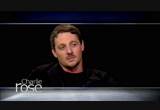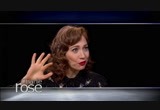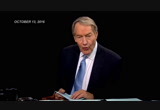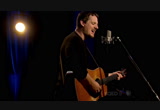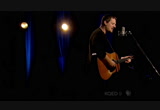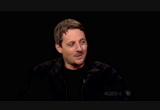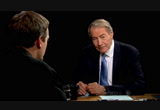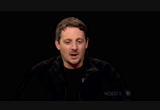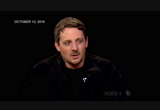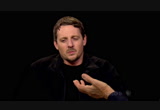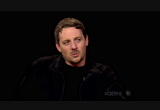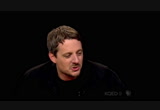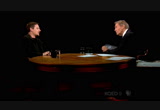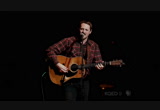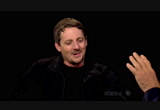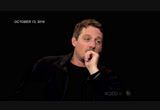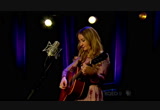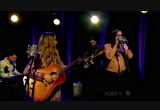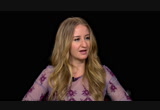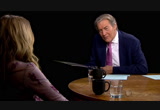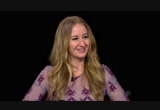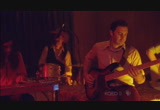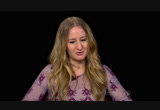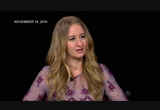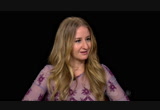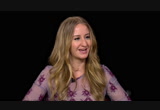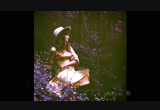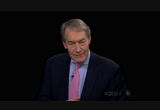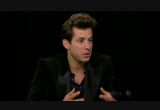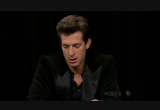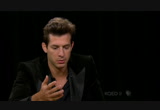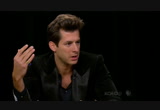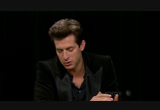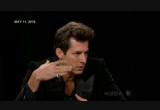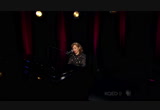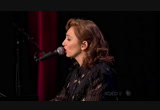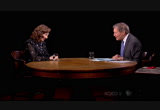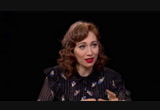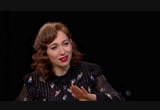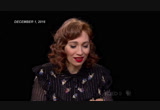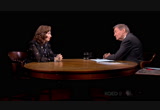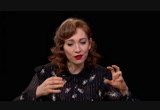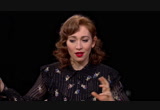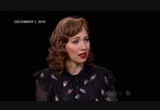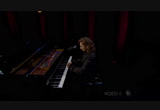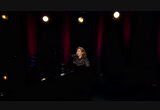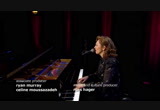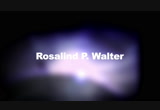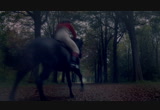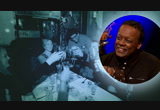tv Charlie Rose PBS January 2, 2017 12:00pm-1:01pm PST
12:00 pm
>> rose: welcome to the program. it is the end of the year and we're looking back at some of the best conversations from 2016. tonight, musicians who came to the table. >> my life has been a very long succession of lessons and even mistakes and bad decisions, and being given this opportunity now, i don't want to say late in life, but late in life for an aspiring musician, but i feel like if this all happened at 23, i would have felt destructed, i wouldn't have used the opportunity for what it can be used for. bum, i had kind of given upthis trying to write pop songs and rock and roll songs and whatever i had been doing in the last four albums. i wasn't worried about if the hook was good enough or if it was melodically catchy enough, i just wanted the lyrical content
12:01 pm
to be there. >> my here's, george martin, quincy jones, they have decades and decades of making great music. maybe i have a best seven to eight years of having made records that could be considered important or that people like, but i just -- it's all i want to do and just get better as a producer and arranger and t do that. >> when i touch the piano, it's like being woken from a dream, and you kind of remember the abstracted sounds of your imagination, but this is a real-life, physical thing. it has hammers, it has strings, it was built. so you are translating yourself, you are kind of translating your soul through these physical objects. >> rose: conversations with musicians when we continue.
12:02 pm
>> rose: funding for "charlie rose" has been provided by the following: >> and by bloomberg, a provider of multimedia news and information services worldwide. captioning sponsored by rose communications from our studios in new york city, this is charlie rose. >> rose: sturgill simpson is here, the grammy-nominated kentucky native is winning over audiences and earning the respect of country legends. his hard-edged country sound paired with his existential sirrics have many calling him the new face of old country. the late merle haggard said, as far as i'm concerned, he's the only one out there. simpson's latest album and mange label debut is called "a sailor's guide to earth." here he is performing the single "all around you." in our studio.
12:03 pm
12:04 pm
♪ and there will be nights that go on forever ♪ ♪ like you're long-lost at sea ♪ never to be found ♪ just know in your heart ♪ that we're always together ♪ and long after i'm gone ♪ i'll still be around ♪ 'cause our bond is eternal ♪ and so is love ♪ god is inside you ♪ all around you ♪ and up above
12:05 pm
12:06 pm
you ♪ >> rose: i am pleased to have sturgill simpson at this table for the first time, and it's about time. welcome. >> thank you. >> rose: it's good to have you. >> pleasure and honor. >> rose: well, especially this. tell me what this represents. >> well, okay, it's a lot of hard work, but i found the reward from hard work is you get to do more hard work. >> rose: yes, i can tell you that. >> yeah, that's the direct outcome of a year and a half plus on the road promoting my previous record and being away from home and my wife and a newborn son at the time and sort of balancing the fact that my dreams were coming true, and it was providing for my family, but, at the same time, it is a little bittersweet just because things took off all at the same time that my family was forming.
12:07 pm
i feel like i missed a lot of that. >> rose: you missed something because something you dreamed of was happening. >> yes. so that was sort of a heart-felt apology/thank you to my wife and son for allowing me to be an artist. >> rose: i love the cover, too. >> thank you very much. >> rose: how would you characterize what you represent, to have people like merle haggard and others saying what they're saying? it's almost like, here's the real deal, thank you very much. >> i don't know that i necessarily am making a focused effort to represent anything, i just know that when we go into a studio or i try to write songs, i guess honesty and trying to represent the human experience from my perspective as undiluted as possible. >> rose: and what was the dream? >> just to make music for a living. i get to go around the world and
12:08 pm
play music for people. >> rose: that's what you do. that's a reality now. that's what i do. i didn't realize that was a dream. my wife pointed it out, i had been a hoppiest me musician untl the last four or five years. >> rose: as an add vocation. cathartic release. i had written songs as a teenager, but i don't want to say -- i have said i'm not a very ambitious person, but i don't think that's the reason it didn't happen. i just didn't know how to start or go act pursuing that, because it is an industry where you do sort ofnoy how to goat a foot in the door. >> rose: and you weren't asking. >> i wasn't asking, no. she stopped me one night and said, you know, you're pretty good at this, and i know you love it, so why don't you try to do something with it? >> rose: do what you love, is what they all say. >> right. and i always worked menial odd jobs. i had, i guess, a strong work
12:09 pm
ethic, so the oakd i was able to apply that to something i love, everything fell in place. >> rose: not everybody can write songs like you. there is no school other than life. >> no school. >> rose: it was life. yeah is that and maybe a poet's vision. >> maybe, to be honest, i probably write poetry more than songs. i have to figure out how to put them to music once we get in the 'tude owe. but the expression in the words is really where it all starts. >> rose: when they compare you to waylon jennings, you say, that's fine, i'll take that. >> i'll take it. it's funny to me because there are probably two or three other people in my mind, if i was trying to emulate anybody, but that's what comes out, i guess there's a resonant tel tembre.
12:10 pm
i guess there is worse things than saying you sound like waylon jennings. >> rose: were there people who said you have a quality to your voice early on? >> friends of mine would give me flack in my early 20s because i wasn't playing or doing anything wit. they said we would rather listen to you han half the shows we go to. >> rose: and then your wife was the one to convince you to do it. >> and it culminated a point in my life where i was working at a job in the railroad, went from conductor, yard master, all the way up to the operations supervisor for the whole facility and, you know, but i realized i wasn't fulfilled and i was really burned out and 80-hour weeks and i hit a point where this can't be it, you know, and she saw that, luckily,
12:11 pm
before i did and sort of pushed me and bought a little 12-track recorder for me to start making recordings at home. >> rose: you take exception of being labeled a post-er boy for traditional country, with names of traditional country people. >> sure. >> rose: it's almost like you like the outlaw. >> i just like not having rules. >> rose: or making them. i like to be able to go from one project to the next without somebody saying you know what you ought to do, or maybe you shouldn't do that. >> rose: yeah, or saying this ishere you fit, go fit. >> yeah, and all of those guys we get compared to, my heros, they were pushing boundaries, they were trying to take -- especially merle was a very elastic musician, he would go a lot of different directions and incorporate a lot of different musical styles into the guise of country music. so i don't think i'm breaking ground here. >> rose: but you say you describe your sound as having
12:12 pm
dirt and grime and life sauce. >> yeah, life sauce. >> rose: what's the life sauce? >> just the wrinkles and scars. i like things to have a cohesive deterioration, if that makes sense. i want to make wide-screen music so you can just immerse yourself in it. those are the records i always loved, anyway. >> rose: this is written from the perspective of a sailor. >> somewhat. there is a little marketing behind that. ( laughter ) i found in talking directly to a newborn child from the standpoint of someone going to sea and not knowing if they're coming back, it gave me a lot of liberty and freedom to say things that i probably never would have felt comfortable enough to get myself into a place of. >> rose: you had to put yourself in the mind of a sailor. >> yeah, that vulnerability was the first thing i thought that needed to be palpable. when i was a sailor, i was much younger and had a family, but i
12:13 pm
remember just being out there for months on end and looking at nothing and thinking -- >> rose: thinking what? well, thinking about all the guys around me that were married and had children and think about what they must be going through, or you think about the guys over there now actually in a war zone writing these letters every day, not that getting on a tour bus and going on the road for months even compares to that, but i just wanted to do something with all the emotions i was feeling at the time, which is home sickness, and even though it was providing for my family, like i said, i couldn't sake this little hint of, wow, this is all really selfish because i'm getting a lot from doing this, but at the same time i'm missing so much at home. but my wife, again, has realized that if i'm home too long, all of a sudden i probably need to go play music. >> rose: was the entertainment
12:14 pm
bug, did that come natural? >> i don't know i have that bit down. i'm extremely nervous when i walk on stage. i don't really talk a whole lot. i try just play my songs and put my mind into the music. >> rose: that gets you going? well, this has all been very recent. we went from playing 300 and 400 people to 3,000 to 4,000 people within two years, and i'm 38 years old, and i came into this game at a later point in life than most people in my position do, so i feel like a lifetime of less than desirable jobs and just being a normal guy, i'm far too normalized to ever really walk out there and just embrace all that in a way that i guess a 21-year-old kid would love it. but myself and all the guys i play with were all very extreme perfectionists, so we just want to put on the best show musically speaking that we can
12:15 pm
every night and maybe i forget there are other parts of that involved. >> rose: you are the first male on your mother's side that didn't work in the mines. >> correct. her father was a foreman on the strip mine for years, and my grandfather, my great grandfather was a deep miner, my mother's brother worked on the strip mine. >> rose: there is a message from your life. i know the word "message" is the worst thing i could have said, but i mean it, though, there is lesson, there is -- >> this is very important to me because my wife ha -- my life hs been a very long succession of lessons and even mistakes and bad decisions and being given this opportunity now -- i don't want to say late in life, but late in life for an aspiring musician. i feel like if it happened at 23, i would have felt
12:16 pm
destructed. i wouldn't have used the opportunity for what it can be used for. >> rose: why do you think you would have self-destructed? >> i had a lust for life, charlie. ( laughter ) my candle was burning at both ends to say the least. >> rose: i hear you on that, but, i mean, at the same time, you would have been -- >> you don't normally have the perspective you do at 38. i didn't, anyway. >> rose: you didn't have the same perspective at 23 as you do at 38. >> no, far from it. >> rose: because you were living life. >> i was living life. a lot of the guys in my band are younger and extremely talented and i don't ever mince words about those things. now is when you should be pouring your all into this so that ten years you didn't waste it all on a bunch of empty. >> rose: and there's a lesson there. >> sure. >> rose: thank you, sturgill. thank you very much. >> rose: margo price is here, the national singer/song wrier
12:17 pm
making a name for herself beyond music city. her sharp song writing and steely vocals recall country greats like dolly parton, emmylou harris and loretta lynn. her album was recorded at the famed studio in him phis called midwest farmers daughter. margo price performing all american maid in our studio this morning. ♪ part of me that hurts the worse is the one i just can't
12:18 pm
spot ♪ ♪ and it's all american made ♪ everywhere i go somebody puts me in the dirt ♪ ♪ everything i say, somebody says they said it first ♪ ♪ but i don't need 10 million, just give me one that works ♪ ♪ it's all american made ♪ i have been all over ♪ something in my bloodline or something in my gut ♪
12:19 pm
12:20 pm
12:21 pm
♪ i wonder if the president gets much sleep at night ♪ ♪ and if the folks on welfare are making it all right ♪ ♪ but dreaming of that highway ♪ baby the stretch is out of sight ♪ ♪ and it's all american made ♪ ♪ yeah, it's all american made ♪ yeah, it's all, it's all american made ♪ >> rose: i'm pleased to have
12:22 pm
margo price at this table for the first time, welcome. >> thank you so much for having me. >> rose: thank you for performing for us. >> of course. >> rose: are you as strong on melody as lyrics? >> i definite think a strong sense of melody is important. when i set out to write the album, i had given up to write pop or rock and roll songs or whatever i had been doing on the last four albums. i wassent worried if the hook was good enough or if it was mee mmelodically catchy enough. it would the lyrics to be there. i think i achieved that. >> rose: the hands of time. yeah, that is a six-minute song. everybody tried to make it my single. i said, i don't know if america
12:23 pm
has sakes-minute attention span. you only have 140 characters most to have the time to get your point across. ( laughter ) but i'm happy i went ahead and kept it. my manager was adamant about having it to be the kickoff to the album. if people can get through that, they can enjoy the rest of the cord because it's not as heavy as that song. >> rose: about to find out. about to find out, i wrote about an acquaintance who's a bit of a sociopath, and it's funny how songs change meaning over time. it seemed to be fitting for the privilege and the separation and the classes that we're dealing with today. >> rose: you did this in three days? >> three days, yeah. >> rose: you pawned your wedding ring. >> yes. >> rose: what else? my husband came into the kitchen one day and said, that's
12:24 pm
it, i'm selling the car. there's no way we'll have enough money. we were selling microphones and guitars and music gear that we'd acquired, mixon boardsenned -- mixing boards and reel to reel machines, then old analog. >> rose: are those days behind you? >> yeah, we still have one car because i'm on the road so much, but i think i'm going to buy an old truck soon. >> rose: a pickup. a ford pickup truck. >> rose: tell me about the songs. one is tennessee song. >> it's kind of a song about enjoying the outdoors and also, you know, the history of where america used to be and where we are now. >> rose: and the next one is you put me -- since you put me down. >> since you put me down, that's a song i co-wrote with my husband, and he started writing
12:25 pm
it. he maybe had a different direction he was going but i definitely used that song to kind of write a scorned love letter to an old manager that did me wrong. ( laughter ) people might think it's about love. >> rose: did you call up and say, this is for you? >> no, but the funny thing was once i started getting some success, he sent me an apology and asked me to sing at his wedding. >> what did you say? i said, i'm sorry, i don't think i can do that. >> rose: that's the way it works. >> but i'm not holding a grudge. >> rose: no, you're not, of course you're not. >> i just didn't want to do him a favor. ♪ ♪ ♪ ♪ >> rose: four years of chances. >> four years of chances, i wrote after a conversation with a girlfriend of mine who was going through a difficult relationship and we were just having a conversation and she
12:26 pm
said, i gave him four years of chances. >> rose: and then you heard a song title. >> i said i'm going to write that song. i went home the next day and it came out in one piece. but i was writing about her relationship and past relationships i had had, but i was also kind of writing a good buy to my old band called buffalo clover, i was with them four years and doing the best i could to keep it together, and when i had to break up with them, it very much felt like a relationship. >> rose: does writing come easier or has it always? >> i'm feeling very inspired. i'm dying to get back in the studio. we're going to go in here in december. i'm full of songs. >> rose: you're full of songs. yeah, i've got even more. >> rose: as she said those words, four years of chances, do you immediately want to go and write it down then? >> yeah. i'll scribble it down somewhere
12:27 pm
because if you don't -- or you're laying in bed, drifting off, the last moments and you think of a song idea, you think you will remember it but you won't. you have to write it then. >> rose: it's a lot confessional, too. >> yeah, i kind of gave myself the humanity to become a little self-deprecating. you know, like you said, trying to find the humor in the bad situations. i had one about a weekend i had to spend in the davidson county jail. >> rose: why did they want to put you in jail? >> i made some bad decisions. what did you do? i was struggling with depression after losing my son. >> rose: yeah. and i had been begging god, really, to put me in a mental home. i just wasn't feeling safe, you
12:28 pm
know, from myself, and i was drinking quite heavily, and i went out one night and had too many drinks and i called the cab but the cab never came, and then i had a little accident and, yeah, that was definitely kind of the turning point where i realized, you know, i don't want to be in an insane asylum, and that's what it felt like in there. >> rose: i don't want to lose control. >> yeah and, you know, i realized i had a son at home, he was the most important thing in my life, and i knew i needed to get it together. so i went and got therapy, took a long time getting clear-headed. >> rose: and how are you today? >> i'm great. i'm a little exhausted, i'm working so much, but i feel happy. >> rose: you were rejected by everybody when you began. >> yes. >> rose: and now you're not. i couldn't get a manager, couldn't get a publicist,
quote
12:29 pm
12:30 pm
12:31 pm
new york city club scene and worked with the biggest names in pop music including adele, amy winehouse and sir paul mccartney. his new album won two awards including record of the year. uptown special according to "time magazine" has skill and intelligence. uptown funk has been viewed on youtube more than 1.5 billion times. here's a look at uptown funk featuring bruno mars. ♪ hollywood, jackson, mississippi ♪
12:32 pm
♪ girls hit your hallelujah ♪ uptown funk gonna give it to ya ♪ ♪ 'cause uptown funk gonna give it to ya ♪ ♪ saturday night and we in the spot ♪ ♪ don't believe me just watch >> rose: mark ronson, welcome. thank you for having me. >> rose: you said you worked on uptown funk to within an inch of its life. >> yes. what happened with that song is it started off as a jam in bruno's studio. bruno was on the drums, i was on bass, jeff was on the synth. sometimes a jam is a waste of time but i've now and then you hit a rhythm and that one felt great. the jam is like conceiving a baby, anything is possible. it could go this way or that way.
12:33 pm
>> rose: improvisational. and that's fun and the sky is the limit, and then you get to the point six months down the line where you're, like, oh, crap, how do we rewrite the bridge for the 15th time. when you have something that everyone in the room feels like has the potential to be great, it's a little tougher to get it to the finish line. >> rose: what's the video done for you? >> you know, i was doing a photo shoot with a photographer from the associated press one day and he said he was leaving the house and his wife said, who are you going to go photograph today if and he said the white guy from the bruno mars video. so bruno mars is one of the great performer entertainer dancers of this whole generation. i know standing next to him, i'm not going to be pulling any crazy moves or anything, but
12:34 pm
it's been amazing to be in something that brought people joy, something that we actually love. sometimes with bands they have their biggest hit and they're, like, man, we hated that song. this is something i'm really proud of and it's crazy to see the life it's taken. >> rose: you produced most of back to black. >> yes, that's the record i probably first became phone fo, you know. i met amy in new york when i used to live here i had a studio on mercer street, and we just hit it off right away. i could just tell she had this -- we just clicked and i really liked her and we started writing the first few days we wrote back to black, and then she wrote rehab, and i made demos out of the songs she already had, and it just kind of happened, and in two weeks we made the album. >> rose: what have you wanted to do that you haven't done? >> i think a lot of things. i mean, i definitely -- some of the things, especially because of the result of this song
12:35 pm
uptown funk, are milestones i never that it i would and i would have been perfectly happy. my career was on a good enough path. and these ridiculous things of playing s.n.l., they wouldn't even be on my bucket list because i would say my bucket list is more grounded in reality, but i think that my heros, people like george martin, quincy jones, you know, they have decades and decades of making great music, and a legacy of great music. maybe i have, at best, seven to eight years of having made records that could be considered important or that people like, but i just -- it's all i want to do and just get better as a producer and arranger and do that. >> rose: you worked on adele's 19. >> i did. >> rose: and 25 as well. and 25. she calls me every six years. i hope i get the call for 31.
12:36 pm
>> rose: explain her to me. just another thing that the voice is just so, i guess, instant. i feel like, for somebody who, like, has such a sunny disposition and is so warm as she is, all the pain and things in her voice that i don't even know if it's that passion and emotion that just locks you in right away. she can sing the phone book and we would line up to buy it. i think she's just -- she's a great song writer and i think authenticity, that's what we're missing right now. >> rose: paul mccartney. yeah, he's somebody that, when i was in the studio, of course your first day of paul mccartney, it's the most nervous you're ever going to be. >> rose: he's a legend. he's a legend, a better producer, musician, song writer than you and you're in the room with george and costello and the
12:37 pm
producers he's worked with. so he gives you a day circle. he knows everyone's nervous so you get a little win wynne can do -- window of kind of, like, all right, we'll let you flub a few things, then you better get over it and make sounds and make him kited about arrangements. but mainly i learned so much from him about arrangements and the stuff he was doing with the beatles was so ground breaking, he's constantly thinking about technology and how to make his stuff interesting, so it's very inspiring working with him. >> rose: where do you think you will be ten years from now or five. >> five or ten years from now? i think we kind of live in an age of musicians where there is a giant sense of entrepreneurialism. okay, i made it as a musician and now i want my own app and i was saying quincy and george
12:38 pm
martin and people leaving a great legacy of music and studying to get better, that's what i want to do, so i would be happy if five or ten years from now i was still working with exciting artistest. >> rose: thank you for coming. thank you very much. >> rose: back in a moment. stay with us. >> rose: >> rose: regina spektor is here, russian-born singer/songwriter has been called her generation's joni mitchell, equal part whimsical story teller and classical trained pianist. tom petty called her one of the most talented musicians alive today, album is called remember us to life. rolling stone says it's full of brilliant underdog songs. older and taller. ♪
12:39 pm
♪ ♪ i remember you older and taller ♪ ♪ but you're younger and smaller ♪ ♪ so who's gonna call her and say ♪ ♪ that you're back again? ♪ and all the lies they were wiser ♪ ♪ and the wise were the lies ♪ and the the lies were on fire ♪ ♪ and the the fires were put out just to be lit again ♪ ♪ you're alone till you're not alone ♪ ♪ and that's all you need to know ♪ ♪ every time you decide to stay ♪ ♪ then the world will make you go ♪ ♪ and that's all you need to know ♪ ♪ all the debts they got at the settled ♪ ♪ and the settlers got cattle ♪ but the cattle was rattled by the snakes ♪ ♪ that were guarding the garden gates ♪ ♪ and you retired just in time ♪ you were about to be fired ♪ for being so fired from hiring the ones ♪ ♪ who will take your place
12:40 pm
♪ all the lies on your resume ♪ have become the truth by now ♪ and the things that you never did ♪ ♪ have become your youth somehow ♪ ♪ you know everything by now ♪ enjoy your youth ♪ sounds like a threat ♪ enjoy your youth ♪ sounds like a threat ♪ but i will anyway ♪ i remembered you older and taller ♪ ♪ but you're younger and
12:41 pm
smaller ♪ ♪ so whose o gonna call her and say ♪ ♪ that you're here at last ♪ and all the days they were longer ♪ ♪ and the drinks they were stronger ♪ ♪ the words we sang wrong ♪ but the songs were remembered ♪ ♪ and time just passed ♪ you're around until you're not around ♪ ♪ and that's all i need to know ♪ ♪ every time you decide to stay ♪ ♪ then the world will make you go ♪ ♪ and that's all you need to know ♪ ♪ enjoy your youth ♪ sounds like a threat ♪ enjoy your youth ♪ sounds like a threat but i will anyway ♪
12:42 pm
♪ ♪ ♪ >> rose: i'm pleased to have regina spektor at this table for the first time. welcome. >> thank you, charlie. i'm so glad to be here. i just love you and the show very much. >> rose: thank you so much. we're honored to have you here. >> thank you. >> rose: and congratulations on this. >> thank you. >> rose: tell us about your musical journey, you know, from prussia to the u.s. >> well, i think my journey has a lot to do with kind people who decided to help because both my parents are artists and artistic, and they really
12:43 pm
believed in, you know, share art, share classical concerts, music was always playing in the house. i had an amazing teacher in moscow. as a matter of fact, that was really the only thing that was kind of holding my parents back when they wanted to immigrate to america. >> rose: what did you want to do? >> when i was really little, i said i wanted to be a composer, and it was explained to me by very nice common-sense people that it's very hard to be a composer and you have to be brilliant to be a composer, but you could be a classical pianist if you want to and play brilliant people's work. somewhere along that line i stopped saying composer and started saying i wanted to be a classical pianist, except when i hit the teenage years, the thing
12:44 pm
that i hadn't realized was that more than your love of music, your emotions, your desperate need to play, you also had to have a talent for a certain kind of work ethic, and that work ethic is a talent in itself, and i didn't have it when it came to sitting those hours and hours, and there's that -- it's like the plane taking off, you have to reach that certain kind of speed to become a classical musician, which is basically an olympian of music, and i couldn't reach it because ipped to, you know, scribble thoughts in a notebook. >> rose: you wanted to write songs. >> i didn't know it, yet, but, yeah, i wanted to write songs, i wanted to write poetry, i wanted to read books as opposed to sit and practice. >> rose: how would you describe your sound? i mean, you've described it as
12:45 pm
using orchestral colors. >> mm-hmm. i think it's hard for me to think of myself as a sound because i am generating music a lot of the time and it comes from just being in the world and oftentimes walking, especially in new york, when i talk to a place, i will write, and then once i have to come in and actually really write, not just in my imagination, then i have to go from the abstract imaginary sounds into real life, so i could hear a sound in my head, and but when i touched the piano, it instantly -- it's like being woken from a dream and you kind of remember the abstracted sounds of your imagination, but
12:46 pm
this is a real-life physical thing -- it has hammers, it has strings, it was built -- and, so, you are translating yourself -- you are kind of translating your soul through these physical object, like violins and voice and piano. so i just kind of explore as much as i can because trying to reach those imaginary colors and not just completely ignore them but be in the real world is a struggle. >> rose: how were you evolving as a musician? if you're no longer an emerging -- you're no longer an emerging artist, are you? >> i feel like i am. i don't know. i think that my interest lies so much in the discovery of music and just the pleasure of making art is so great and the moments
12:47 pm
when i get to do it i feel so privileged to do it that that's what i think about, so it's hard to know where i am in the trajectory of how i'm perceived or what i should be doing. i just sort of think, oh, this is the song, what does it need? okay, that's down. now this is this song. oh, it needs something completely opposite. okay, i can do that. you know. >> rose: how much of your work is autobiographical? >> also very hard to know because so much of the fun for me comes from the imagination and trying to get out of my own perspective and experience other perspectives. i think that when i think of my tribe, i think of fiction writers and poets, and also
12:48 pm
playwrights. >> rose: like. salinger and -- >> rose: phillip roth? i feel like he's much more -- well, maybe i'll get there. he's darker than i am. i feel like, with everything that's happening in the world, i might get there, you know. >> rose: but it's more classical than like khekov. >> and i feel very much at home in the surreal. that's where i feel at home. when i'm in the real world, sometimes i have to almost pretend because it seems so surreal to me. >> rose: there are those who say your music is autobiographical and this album is more autobiographical than previous ones. >> that's the thing. i think in our world, in the arts, we have created this false
12:49 pm
divide between confessional artists and fiction artists. and then there is the narrative th the confessional people really care and they're putting their soul into it and honest, and that fiction writers are just making stuff up and are arms' length. but to me, a dylan song, even though it's surreal and has images from biblical and historic and all these other things that he's pulling from, it's not any less of his soul than joni mitchell, who is writing from her life story, and i feel like my soul and personal experience is in everything, but if i engage my imagination, then i can look at something through multiple perspectives, as a man, as somebody who believes the opposite as i do in the world. we have to push ourselves to
12:50 pm
look at things from other sides, otherwise we get really stuck and, also, we get these superiority complexes. >> rose: how then do you create your art? how then do you write a song? >> i feel like if i knew exactly the answer to it, i would have a lot more songs, first of all. second of all, i think that it's a combination of letting certain stories and certain emotions, there is, like, an intake process and then an output process, and then, when things kind of live through your system and you meet certain inspiring individuals, you read certain inspiring things, you see enough stories unfold before your eyes, then you are compelled to, in that moment, to write a song. but i don't really know. i do feel it's inspiration and sometimes it happens and -- >> rose: but when you write
12:51 pm
songs, do you think of melody, do you think of the music? or is it simply words you will find the music for later? >> no, i usually will write at the same time. i usually will go to the piano and sing the words and play the piano and it kind of comes out the same time, and then i sort of play it over and over, pain sometimes like 500 times in a row, until it all just settles on itself. >> rose: did you once write all the lies on your resume have become truth by now? what did that line mean? >> it's really hard to say because the thing is, so i just -- i just came off of a tour, right? and i was just playing these songs they just played in the u.k. and europe, and i was playing these songs a lot of them that are new to me from this new record, and on different nights, different lines would hit me a certain way
12:52 pm
of my own lines that i wrote, and i would think, oh, that means this. i mean, it was -- i had this really incredible experience of, because i had it before and after, you know, we found out about the election results in the u.k., and certain songs that i had played in one way, the lines meant something else to me after. and i feel like they are my friends and i lean on them and i don't fully foe what they mean, but the comfort that i have of playing them year after year is that they mean more than i know. so i don't want to limit them with my understanding of them at this moment because, in five years, it could mean something else to me or something can happen, and that line will take
12:53 pm
on a totally different meaning. >> rose: is this both pop and classical? >> yes, and i love both very much. and classical is my home, you know. it's before my consciousness, even, like, it was just there. it was there kind of like air. >> rose: thank you for coming. thank you very much. >> rose: the album is called "remember us to life." thank you for joining us. see you next time. ♪ ♪ ♪ ♪
12:54 pm
12:55 pm
♪ won't know that the devils are near ♪ ♪ somewhere below the grand hotel ♪ ♪ there is a tunnel that leads straight to hell ♪ ♪ but no one comes up for the souls anymore ♪ ♪ they come for some comfort and for the dance floor ♪ ♪ and hiding sharp horns under fedoras ♪ ♪ do not disturb signs instead of a chorus ♪ ♪ they toss and turn until the dawn comes ♪ ♪ on soft sheets until the dawn comes ♪ ♪ no one sleeps at the grand hotel ♪ ♪ room service, mini-bar ♪ scented soaps, chaufferred cars ♪ ♪ stay a day ♪ stay a week ♪ here's the tunnel, take a peek ♪ ♪ just call up your friends at
12:56 pm
the front desk ♪ ♪ any hour at the front desk ♪ call up your friends at the grand hotel ♪ ♪ you will always have friends at the grand hotel ♪ >> rose: for more about this program and earlier episodes, visit us online at pbs.org and charlierose.com. >> rose: funding for "charlie rose" has been provided by: >> and by bloomberg, a provider of multimedia news and information services worldwide. captioning sponsored by rose communications captioned by media access group at wgbh media access group at wgbh access.wgbh.o
1:00 pm
man: it's like holy mother of comfort food.ion. kastner: throw it down. it's noodle crack. patel: you have to be ready for the heart attack on a platter. crowell: okay, i'm the bacon guy. man: oh, i just did a jig every time i dipped into it. doug: ...which just completely blew my mind. woman: it felt like i had a mouthful of raw vegetables and dry dough. sbrocco: oh, please. i want the dessert first! [ laughs ] i told him he had to wait.
297 Views
IN COLLECTIONS
KQED (PBS) Television Archive
Television Archive  Television Archive News Search Service
Television Archive News Search Service  The Chin Grimes TV News Archive
The Chin Grimes TV News Archive 
Uploaded by TV Archive on

 Live Music Archive
Live Music Archive Librivox Free Audio
Librivox Free Audio Metropolitan Museum
Metropolitan Museum Cleveland Museum of Art
Cleveland Museum of Art Internet Arcade
Internet Arcade Console Living Room
Console Living Room Books to Borrow
Books to Borrow Open Library
Open Library TV News
TV News Understanding 9/11
Understanding 9/11